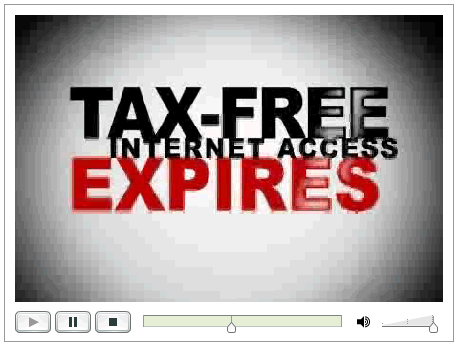
Because of quirks in many state laws, sales taxes may be levied on CDs sold in storefronts but not on iTunes and other digital downloads. It’s a situation that recession-weary, tax-hungry politicians are hoping to change.
A growing number of states are considering laws to tax digital goods, such as iTunes songs, Amazon MP3s, or electronic books. Yet at a time when governments say they want to encourage broadband adoption and the development of a low-carbon economy, opponents say taxing digital goods sends exactly the wrong message.
Mississippi is one of the latest states to write into law a tax on digital products. The measure, which was adopted mid-March and goes into effect July 1, imposes a sale and use tax on specified digital products–including digital audio-visual works such as movies, digital audio works such as ringtones, and digital books.
Republican Gov. Haley Barbour endorsed the legislation via Twitter. “On HB 1461, I support this bill and here’s why: This bill will treat Internet sales like catalog sales making it a level playing field,” he said on March 11.
One way or another, the Internet is going to be taxed.















Quite expected.
They are going to tax the ones, and the zeroes?
“Because of quirks in many state laws, sales taxes may be levied on CDs sold in storefronts but not on iTunes and other digital downloads.”
It’s not a “quirk”. The sales tax laws were written for tangible goods, not services or intangible items.
Get your cash out.
It makes no difference if you make orders online or from a catalog. If you’re buying from a business located in your state, you’re likely to pay sales tax. Has nothing to do with making online orders “fair and equal” with paper catalogs. Total bullshit.
Barbour will never be president with stupid moves like this…or will he? total moron!!
“They are going to tax the ones, and the zeroes?”
They can only tax the ones, as ten percent of zero would equal zero.
A question arises from #3’s explanation: When does it stop being bits?
If I go down the street and buy software on CD or a DVD-ROM, I pay tax. If I download the same software via the Internet, did it become intangible? In either case, I am buying bits. Bits on a ROM device or bits on my hard disk. Clearly the issue is not one is bits and the other isn’t. It is a situation where one method is taxed and the other is not.
For legislators, the problem is one of money vs. votes. If Internet merchants gave them enough money, there would be no taxes on Internet sales.
In the absence of enough money, a system that does not tax identical goods in identical ways means some voters will loose their jobs because their former employeers cannot compete with the Internet. The unemployeed will not vote for incumbents, is the fear that drives this.
and yet another reason to find other ways of getting mp3’s…
Sales tax… what a silly idea.
In the EU we get taxed on orders on the internet and have been for as long as I can remember.
I was quite surprised to hear that many states don’t charge tax for online orders.
The Governor of Mississippi, Haley Barbour, is an unbelievable hypocrite.
# 11 Nimmo said, “In the EU we get taxed on orders on the internet and have been for as long as I can remember.”
Which is why so many from EU purchase S/W from US sites…
I think a politician needs to be “tea bagged”. 🙂
“This bill will treat Internet sales like catalog sales making it a level playing field,”
Catalog sales are only taxable, when the company you are buying from, physically exists in your State. Ordering from an out-of-State firm, has always been untaxed. If this was the same for internet based firms, they could completely avoid charging taxes, by having servers in two or more States. And always processing orders only from out of State customers. So obviously Congressmen want to make internet vendors *NOT* like catalogs. And be taxed from all customers, everywhere. Even from overseas. Which I’m sure has Congress smacking it its lips. But this is bound to kill oversea sales, for US vendors. As if US businesses don’t have it tough enough already. The tax aught to be applied to oversea internet firms only. To help save domestic firms from being undercut by their lower costs in labor and taxes. Is Haley Barbour out to destroy domestic online businesses by collecting taxes from anyone who dares to order something from a US concern? Of course it’s only being applied to digital media, for now. Because their “region” protection scheme makes such products almost useless overseas. Perhaps the tax is meant to further discourage overseas customers from buying US movies, and watching them on devoted region 1 DVD players.
This sounds as if Congress is once again, only thinking of protecting the MPAA and RIAA members’ international marketing and pricing schemes, and their profits. When did our government become such a lackey to every whim of corporate greed and paranoia?
Didn’t FOX and the republicans just make a big deal about taxes and government taking to much money. Wasn’t the south, like Texas, Mississippi and Alabalama the area of the most complaints, with people even going around bragging about having someones nuts hanging in their face.
This is so confusing.
Many states already have laws on the books forged back in the 1940’s about interstate taxation. Commonly called “use taxes”, it forces you to pay state tax on purchases bought out of state. These antiquated laws were pretty much ignored until recently, when tight budgets and the boom of internet sales has given states a new revenue stream by demanding use taxes on purchased goods. Watch for it on you state income tax form.